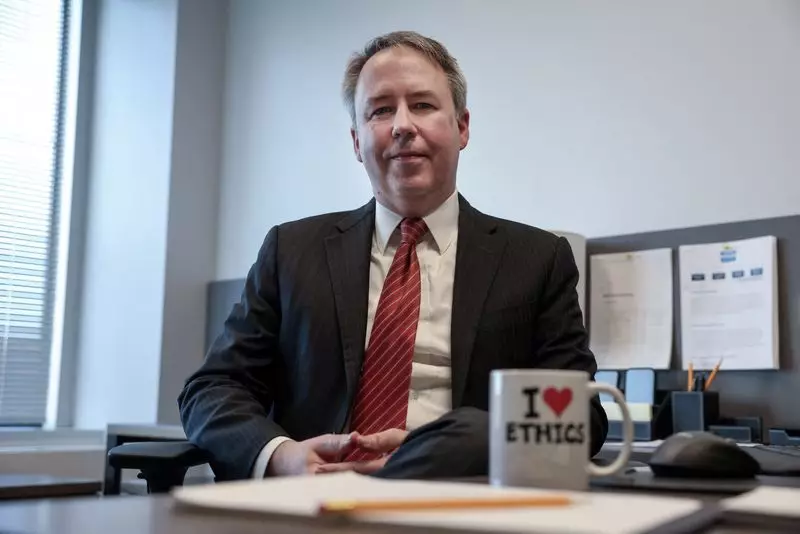As the political climate in the United States shifts with each administration, the function of the Office of Government Ethics (OGE) becomes increasingly critical. The OGE is tasked with ensuring that federal employees act in the public interest and avoid conflicts between personal finances and official duties. This responsibility becomes pressing during transitions, especially with high-profile appointments that may carry significant financial entanglements. Undoubtedly, the incoming ethics director, David Huitema, faces challenges unique to the second term of President Donald Trump, as scrutiny of nominees and their financial disclosures takes center stage.
Having previously spent nearly a decade as the ethics chief at the U.S. State Department, Huitema is stepping into a role that demands both vigilance and impartiality. As he prepares for the January inauguration, Huitema is set to lead an ethics team that will evaluate the financial backgrounds of Trump’s cabinet nominees—many of whom have expressed skepticism towards the institutions they are set to oversee. This potentially sets the stage for an uphill battle that may involve not only ensuring compliance but also fostering a culture of ethical behavior amid skepticism.
History is not without precedent; Walter Shaub, Huitema’s predecessor, encountered significant pushback while trying to uphold ethical standards. His short tenure should serve as a cautionary tale, highlighting the ever-present tension between government service and personal interests. Given that Huitema comes into this role amidst troubled waters, he must balance the enforcement of ethics regulations with the need to build trust among those he oversees.
At the heart of the OGE’s mission is the evaluation of potential conflicts of interest arising from financial ties to businesses within the incoming administration. Huitema has expressed confidence in the intentions of the new appointees, yet the breadth of financial interests among Trump and his close advisers, such as billionaires who offer economic advice, complicates this evaluation process. The OGE must actively monitor these ties, completing extensive financial disclosures for presidential nominees while also empowering the public to engage in oversight.
The process requires clarity about the financial interests of nominees and the potential conflicts they present. Ideally, financial disclosure reports offer insights into where personal interests may intersect with public duty. However, this can only be effective if nominees adhere to the deadlines established for these disclosures, typically expected within five days of their nomination. Eager to foster transparency, Huitema emphasizes the public’s right to access this information as a mechanism for accountability.
While the OGE plays a pivotal role in advising federal employees on navigating potential conflicts of interest, the ultimate enforcement of these guidelines rests with the Department of Justice (DOJ). Should conflicts arise, the OGE collaborates with agency ethics officials to address them, aiming to preempt disputes before they escalate into criminal matters. However, the effectiveness of this system hinges not only on adherence to regulations but also on the willingness of the DOJ to take ethics seriously.
Huitema’s reflections on this dynamic shed light on the complexities of sustaining ethical governance. When engaging with officials who often transition from a business-oriented mindset, the challenge becomes explicit: the government must instill an understanding that personal gain should not dictate decision-making. Therefore, Huitema aims to implement comprehensive ethics training, specifically tailored to bridge the gap between private interests and public responsibilities.
Huitema’s focus extends beyond mere compliance; he sees his role as integral to countering growing cynicism toward government institutions. In his congressional testimony, he articulated the OGE’s responsibility to foster a culture of integrity—a vital factor in restoring public trust. His belief that ethics can be taught is a hopeful assertion, suggesting that as the incoming officials engage in rigorous training, they might transition from a focus on self-interest to a commitment to the public good.
As the landscape of government continuously evolves, the OGE finds itself at a crossroads where the efficacy of its ethical oversight will be tested. The struggles within government can indeed undermine democratic principles, making it all the more essential for the OGE to adapt and remain vigilant against potential ethical breaches. Ultimately, the success of Huitema’s tenure may pivot on his ability to navigate these intricate challenges and spark a renewed commitment to ethical standards among federal employees.
David Huitema’s appointment as the OGE director marks a moment of both opportunity and challenge as the government faces the trials associated with ethical governance. The road ahead will require unwavering commitment to transparency, accountability, and educational efforts aimed at bolstering public trust in an era marked by skepticism. As Huitema embarks on this critical mission, his leadership will play a defining role in shaping the ethical framework of an administration with ample complexities, ensuring that the principles of integrity and public service prevail at the core of government function.

